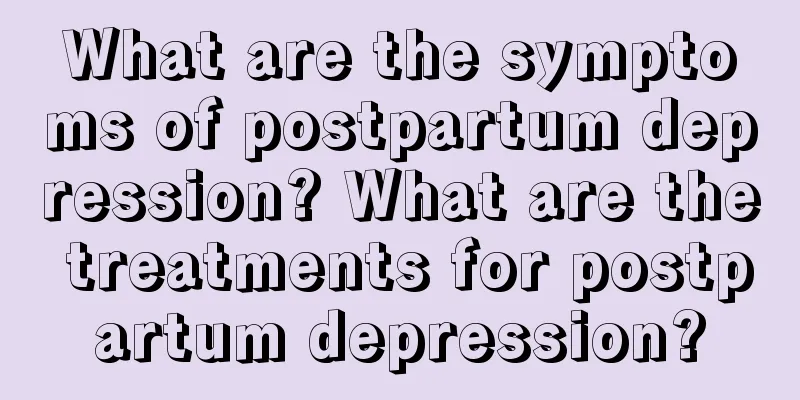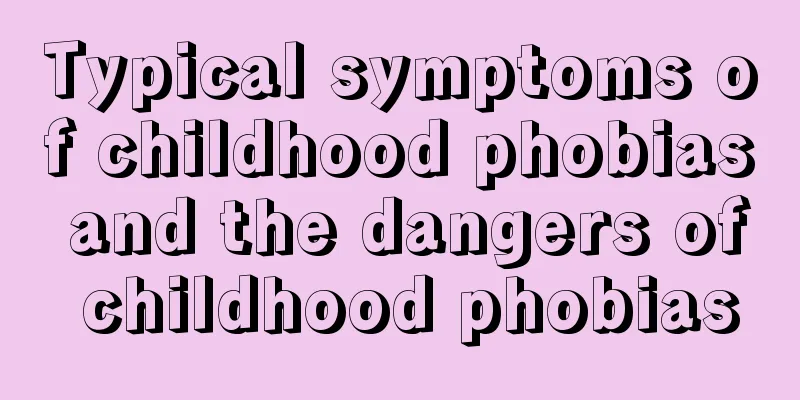What are the symptoms of postpartum depression? What are the treatments for postpartum depression?

|
Postpartum depression is a very common topic. Many pregnant women are prone to depression after giving birth. Postpartum depression is very dangerous. Pregnant mothers must adjust their mood well after giving birth. What are the symptoms of postpartum depression1. Depression: The patient will feel low, sad and miserable for a long time, which will be more serious in the morning or at night. Sometimes the mood is low during the day and high at night, showing the phenomenon of day and night reversal. 2. Bad temper: The patient may feel irritable towards other people's children or his own baby, and the target of venting is usually his partner. 3. Fatigue: Generally, women after childbirth will feel tired, but patients with postpartum depression will be so tired that they think they are sick. 4. Insomnia: Patients generally have poor sleep or severe insomnia, so they feel drowsy during the day. 5. Loss of appetite: Patients usually do not feel like eating, but sometimes they may relieve stress by binge eating. However, they will feel guilty and uneasy about obesity afterwards. 6. Loss of interest: The patient no longer feels attracted to the things he used to enjoy, and his previous interests have become boring, and he lacks interest in daily activities. He often feels that his brain is slow to react, it is difficult to think about problems, his initiative is reduced, he is tired of life, he has lost confidence in life, especially he has lost interest in sex life, which further affects the relationship between the two parties. 7. Unable to cope with life: The patient will feel that he does not have enough time and that things are not done well, but he loses the motivation to improve the situation. 8. Guilt: Patients may feel guilty for adding to the pressure on their family due to their illness, and may also blame themselves for looking at things from a negative perspective. 9. Anxiety: Patients often feel anxious because they are afraid that they don’t know how to take care of the baby, and at the same time they worry about the baby’s health. 10. Develop thinking disorders, persecution delusions, suicidal thoughts or attempts, and even infant harm or suicidal behavior. Treatment for postpartum depression1. Psychological and psychiatric treatment: During the delivery process, nursing staff should accompany and guide as much as possible, give comfort and encouragement, teach them how to use relaxation techniques during the pain intervals, eliminate their helplessness, and enhance their confidence in delivery. Allow family members to accompany, give care and attention, reduce loneliness, and relieve tension. Timely replenish easily digestible food and water to reduce the consumption of physical strength and energy during the delivery process. Preoperative psychological care should be done for parturients who undergo cesarean section to reduce their fear and worry about the operation. Provide a quiet and comfortable environment after delivery, appropriately limit the visits of relatives and friends, concentrate nursing work as much as possible, improve efficiency, and allow parturients to have enough rest. Give easily digestible and nutritious food to help parturients recover their physical strength as soon as possible. Actively communicate with parturients, listen to their thoughts and feelings, give encouragement, help them acquire knowledge and skills of breastfeeding, explain to them that keeping a happy mood can promote milk secretion, teach parturients and family members general knowledge and skills of caring for babies, and stimulate their positive psychological response. For parturients who have experienced abnormal pain during childbirth or have adverse pregnancy outcomes, psychological care should be focused, protective medical care should be given, and mental stimulation should be avoided. Prenatal education is also necessary. Education on mental health should be conducted for the parturient's husband, parents-in-law, parents and other family members. Family members should communicate well with each other, establish a warm family atmosphere, give the parturient meticulous care, care about the parturient's psychological feelings, and try to avoid sensitive issues that stimulate the parturient's emotions. If there is a history of perinatal depression, the parturient is more depressed, and the baby is irritable, sufficient attention should be paid to identify psychological problems in a timely manner to avoid delaying treatment. 2. Drug treatment: Currently, tricyclic antidepressants are still used as first-line drugs for the treatment of depression. Second-generation atypical antidepressants are second-line drugs. The efficacy of various tricyclic antidepressants is comparable, and clinical selection can be based on the strength of depression and sedation, side effects and patient tolerance. Imipramine and desipramine have weak sedative effects and are suitable for depressed patients with psychomotor retardation. Amitriptyline and doxepin have strong sedative effects and can be used for patients with anxiety, agitation and insomnia. However, tricyclic drugs have large anticholinergic and cardiovascular side effects, so caution should be exercised when using them. There are many types of second-generation atypical antidepressants, including selective 5-HT reuptake inhibitors such as fluoxetine, paroxetine, and sertraline. They are widely used, have few side effects, good safety performance, and can be used for long-term maintenance treatment. The treatment of bipolar depression is the same as that of unipolar depression, but bipolar patients may turn into hypomania when using antidepressants, so antidepressants and lithium carbonate are often used together. Patients with depression accompanied by hallucinations and delusions often need to use antipsychotic drugs in combination, such as fluphenazine and sulpiride. 3. Physical therapy: Compared with drugs, physical therapy has the characteristics of no side effects, dependence and significant therapeutic effect. Transcranial microcurrent stimulation therapy is a physical therapy that stimulates the brain through microcurrent, which can directly regulate the brain to secrete a series of neurotransmitters and hormones that help improve depression. It increases the secretion of 5-HT, promotes the release of norepinephrine, and enhances the excitability of nerve cell activity, thereby relieving individual depression. By promoting the secretion of endorphins with a sedative effect, patients can maintain a relaxed and comfortable mental state, which is conducive to better alleviating the previous negative and depressed emotional state. In addition, by improving the patient's brain waves and various physiological indicators, it plays a role in improving the various physical symptoms of depressed patients. 4. Electroconvulsive therapy: Patients with depression should strictly prevent self-harm and suicide. For those with strong suicidal ideas, electroconvulsive therapy can achieve immediate results. After the condition stabilizes, medication and consolidation can be used. Causes of postpartum depressionOn the one hand, there are psychological factors. Pregnancy gains weight, and the appearance changes that cannot be quickly restored after childbirth. Immediately after giving birth, you have to face the pressure of taking care of the newborn, as well as the pressure of postpartum finances, taking care of the family, or getting along with family members. Feeding and coaxing the newborn cause lack of sleep. The newborn grows quickly, and the mother has to face the rapid changes in parenting development, etc., which may make the mother depressed, frustrated and anxious. If you don’t get the help and understanding of your family at this time, your mood will fall to the bottom, which will become the last straw that bends the camel's back. On the other hand, there are physiological factors. The hormones of postpartum mothers will change dramatically, especially the sharp drop in estrogen after giving birth will cause serious emotional disorders. In addition, genetics, personality, family atmosphere, and work environment can all be the cause of postpartum depression, so postpartum depression is a multi-factorial disease. Nursing for postpartum depression1. Seek help proactively If a mother feels uncomfortable physically or mentally after giving birth, she should seek help from others as soon as possible, such as relatives and friends, to avoid severe postpartum depression. Of course, her husband, as her significant other, must not be let go. The company of her significant other will reduce the sense of loss. 2. Get enough sleep When the baby is sleeping, the mother should also try to rest or take a nap. Lack of sleep can also make people feel depressed. If you can ask your husband to do anything, ask him to do it. He can't help with childbirth, but he can always take care of it. Sharing all the chores with family members will make the mother feel much more relaxed. 3. Healthy diet Supplement nutrition appropriately and avoid overeating to avoid affecting the recovery of the body after childbirth. Breastfeeding mothers should ensure sufficient milk, and mothers who do not breastfeed should keep their food intake similar to that before childbirth and pay attention to balanced nutrition. 4. Relax your body and mind After giving birth, you can also participate in some social activities, have a candlelight dinner or watch a movie with your husband to relax your body and mind. Mothers can also find their own hobbies and interests. They don't have to focus all their attention on their children. Having more things to distract their attention will make them feel more cheerful. 5. Exercise properly You can do yoga and other appropriate exercises after giving birth, but you can't rush to get back in shape. You can give yourself six months to a year, and healthy exercise and diet will make you lose weight beautifully and last longer. Of course, watching yourself slowly lose weight, you will become more confident and less depressed. 6. Seek professional help If the postpartum mother's depression has reached a more serious level, it is recommended that the family seek help from a doctor. If a pregnant woman is found to be suffering from postpartum depression, family and friends must take it seriously, contribute their own strength, and help the new mother in person, provide psychological counseling and treatment, and avoid worsening of the condition. |
>>: How long after giving birth can you lose weight? How to lose weight after giving birth
Recommend
Why do children often cough? What should I do if my child often coughs?
Coughing is a very uncomfortable state. Why do ch...
Girls' names from Tang poetry Recommended nice girl names from Tang poetry
Tang poetry and Song lyrics are beautiful texts t...
What to do if your baby hiccups? How to treat baby colic?
We often experience hiccups in our daily lives, b...
Can red and blue Zhenshiming eye drops be used together? How about Zhenshiming eye drops?
Zhenshiming eye drops come in red and blue. Can t...
Can a 6-month-old baby eat egg yolks? Pay attention to these when eating egg yolks
Egg yolks are very nutritious. Many parents want ...
What is a false pregnancy in women and why does it occur?
Expectant mothers are happily preparing for pregn...
Should children with allergies go to the hospital? What medicine should children with allergies take?
Children's allergies are a relatively common ...
What are the causes of nasal allergies in children and how to relieve them
Many children have allergic symptoms. In addition...
What are the causes of turbid amniotic fluid? The cause needs to be found out as soon as possible
Amniotic fluid is the place where the baby in the...
Why are pregnant women afraid of heat? Is it normal for pregnant women to be afraid of heat?
I wonder if expectant fathers have noticed that w...
Baby name? What's a good baby name?
A name is something that accompanies everyone thr...
Can I keep a cat while pregnant? What should I pay attention to when keeping a cat while pregnant?
Many people keep cats before they get pregnant, b...
Will too much urine on the pregnancy test stick cause errors? Will too much urine on the pregnancy test stick affect the results?
When using a pregnancy test stick, as long as the...
How about Omo laundry detergent? Is Omo laundry detergent neutral?
Omo has been in the Chinese market for more than ...
The correct way to hold a baby The correct way to hold a baby
Many parents who become fathers for the first tim...









